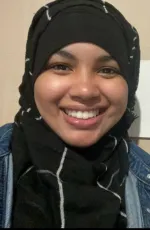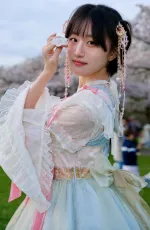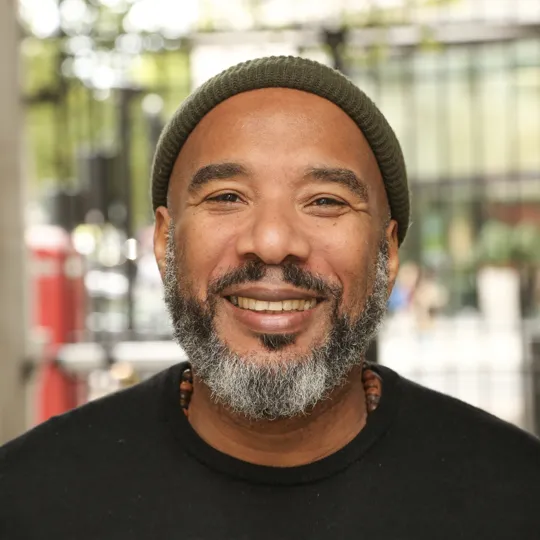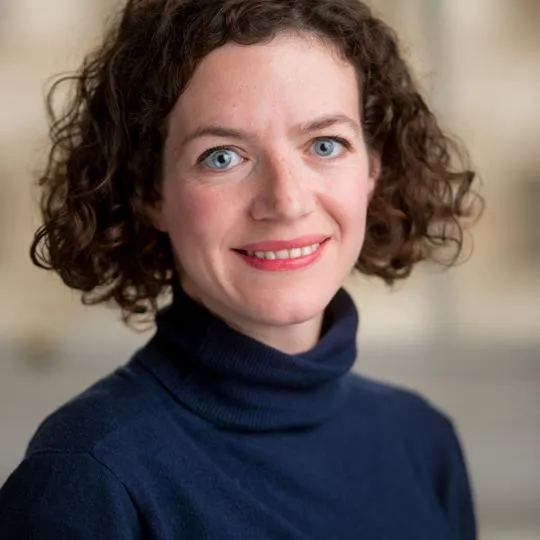In the winning poem 'Flowers and Tealights', the poet has skilfully used form and language in ways which echo the theme of community. The use of rhythm and repetition is innovative and engaging. Home and community are both universal and familial here, woven into a sense of loss and returning.
Dr Anthony Joseph, Lecturer in Creative Writing
14 May 2025
Winners of 2025 Cosmo Davenport-Hines Poetry Prize revealed
One winner and two runners-up have been chosen for this year's Cosmo Davenport-Hines Poetry Prize on the theme of 'Community'.

This year's judging panel consisted of three colleagues from the Department of English: Dr Anthony Joseph, Lecturer in Creative Writing; Dr Rowan Boyson, Reader in Eighteenth-Century and Romantic Literature; and Dr Carl Kears, Lecturer in Medieval Literature.
Theo Grange wrote the winning poem, 'Flowers and Tealights', which will be published in Wild Court, the poetry journal based in the Department of English.
Two poems were awarded runners-up prizes; both of these entries are shaped by theme. In 'tokari banana wala', Zaynab Richardson uses the metaphor of weaving to consider ageing and genealogy. In 'Waterloo Communion' by Rongshan Sha collegial space becomes a communal one, in which the diversity of the King's campus and environ itself is celebrated.
The prize, which is open to all students at King's, was set up in memory of English student Cosmo Davenport-Hines.
The students share the inspirations behind their poems below.

Winner: Theo Grange
''Flowers and tealights' was written in light of the recent passing of Aalia Mohamed, highlighting that our time at university, while ephemeral, is one that we collectively share. This idea of community encapsulates the Cosmo Davenport-Hines Poetry Prize, which remembers the work and lives of every student at King's - those who have left, and those still with us.'

Runner-up: Zaynab Richardson
'With the theme of community, the poem is inspired by my parents who always support me in my endeavours and my grandma who held my family together. She tried to grow every plant possible in her garden from apples to root veg, and even one mango plant she managed to sprout in our grey British weather. Every summer we went to help her pick and dig up the produce like little farmers. She also had these hand weaved baskets from Pakistan that we put the veg in. Her native tongue was Urdu so I put it in a way she could understand. She passed away due to a medical malpractice dilemma very suddenly. When she did we lost part of that community forever. After that I spent some years working in healthcare and came to the understanding of how that dilemma came about and working with patients just reminds me of her. Knowing what I do now, I take my responsibility of working in healthcare very seriously.
So in the end I’m the basket weaver, the threads are communities that I’ll try to keep together. If I do enough good in this world maybe I'd be worthy to meet her in the next.'

Runner-up: Rongshan Sha
'Inspiration for this poem comes from my ongoing commitment to equality and inclusion. As a student at King's, an international university with a large international student population, I believe that difference should not be met with fear or rejection, but with curiosity and acceptance. Through my poem I wanted to convey this message and emphasise the value of embracing diversity rather than distancing ourselves from it.'
Read the three commended poems below.
'Flowers and tealights' by Theo Grange
white dust sheet and a moving
van suddenly takes me from where
i called home. front step of a house
empty coffer where it was and i ask
my mum where i’m going she says
its where the heart is. the last train
no return ticket yesterdays carriages
reflected in dark tunnels. vena cava.
upstream swimming strangers head
back to the station where i said i’m from.
your neck red blazoned tells us that
we are family our bus taking us to
where we’re from. sharing no blood
exchanging no words but maybe just
a glare or a nod or a smile or a wave.
standing in silence it stops we step
the same pavement the same path
the same place that we say is ours
until we depart but not departed
just departing. my mum told me
home is a place that people leave.
white dust sheet and a moving
van suddenly takes her from where
we call home. front step of our house
empty coffin where it was and you ask
me where she’s going and i say
she’s going home. our necks red
blazoned tell us that we are family
that we do share blood that we can
exchange words so we stand in
silence when our heart stops.
in the same place you ask me where
she’s going and i say she’s still here.
standing. us as flowers and tealights.
tokari banane wala by Zaynab Richardson
We’re held, guarded, by the bruised arms of the founding pillars –
of the bloodline.
Surrounded by the calloused hands of our un-named remnants,
Giving blessings with no charged fees,
My ankles, my parents, growing old in stature and face,
their swollen darkened eye-lids tense,
but never fail, to lead me down the weaving path of a healer,
Trace your hands along the riveting, rising, and falling prominences of the bottom,
Where we gathered and prayed and sent our lights with you,
Like the freshly picked root vegetables you governed,
when you were dug up, we were like the soil that lost its principles, with no base to stand on, we fell through.
with hands capable of healing institutions,
I reform the boundary of untethered ends of tweed baskets,
each patient has a place, a collective purpose,
I tighten my grip, and wilfully usher in the dawn with my duty,
To find a way back to you—
by letting them leave the way they came
Waterloo Communion by Rongshan Sha
My suitcase still breathes of Hangzhou tea leaves,
whispers of home steeped in Confucian ghosts,
now resting beneath Brutalist concrete spines
where Pentecostal hymns waltz with Beijing roast.
In Lecture Room 1.11, we unmap borders—
your Lagos cadence lifts my fractured "others."
We scrawl Fanon in Mandarin margins,
as samosa grease smudges Hegel’s reckonings.
The café queue hums like a UN summit:
Persian verbs dance with Yorkshire slang.
You shape my tongue around “democracy,”
I guide yours to trace 平等 (píngděng)—equality.
At the 24-hour library’s neon shrine,
a Syrian law student breaks her mother’s thyme
cookies. We dip them in bitter British tea,
rewriting Foucault with crumbs on knee.
Southbank’s skateboard thunder beats our debates—
you quote Arundhati Roy to counter my Mencius,
while Polish Janitor Marta laughs, translates:
"All wise men sound same scrubbing midnight floors."
Our Waterloo is no battlefield nor crown,
but headphones split between C-pop and grime,
pierced ears cradling twin hometowns,
brewing utopias in borrowed pantry time.



